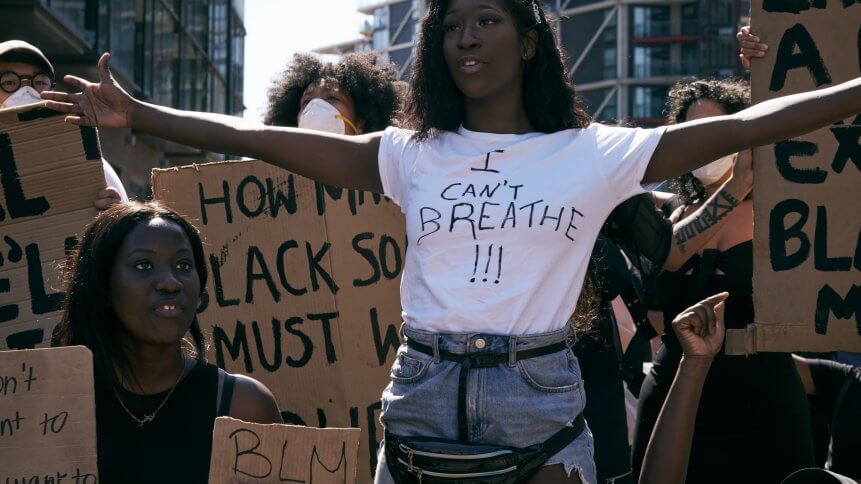Diversity will be a workplace deal-breaker for Gen Z, finds Intel

- Amid the chaos of the pandemic, the Black Lives Matter has shaken perspectives on diversity in the workplace
- Workplace diversity and inclusion is not only the ‘right thing to do’, but it’s also what a new generation of workers expect
- Gen Zs say employer values are almost as important as salary when it comes to a potential position
Among other things, we may remember 2020 as the year that bucked long-held, outdated ways of working. Plunged into remote working, we’ve seen how technology enables many of our businesses to really operate just as well from anywhere.
There has also been a societal wakeup call on diversity and inclusion — the Black Lives Matter movement has underlined the extent of racism and racial inequality that exists in all areas of society, including at work. The #MeToo movement has demonstrated the reality of workplace sexism and barriers to career progression women still face. Almost a fifth of LGBT employees in the UK have been the target of negative comments or behavior from their co-workers.
Businesses must take action to make workplaces inclusive and diverse. It’s not only the right thing to do now, but those that don’t will quickly lose relevance in the eyes of the next generation of workers, who see these values as ‘table stakes’ for their future employers.
Generation Z — those ages 18 to 24 — are set to represent more than 1 billion of the global workforce by 2030, according to a new report by Intel, which explores what this group will value when considering their future workplaces: “As Gen Z employees enter the workforce, they are going to make their voice heard on the importance of diversity and inclusion,” said Megan Stowe, director, EMEA strategic sourcing and international supplier, diversity & inclusion at Intel.
According to a report by CNN Money, Gen Z and millennials are the most diverse groups in history. Only 56% of the 87 million millennials in the US are white, as compared to 72% of the 76 million members of the baby boomer generation.
“Many have personally experienced discrimination as a result of gender, ethnic background, disability or sexual orientation, and are seeking career opportunities that align with their ethics and social values,” Stowe said.
“Companies must accelerate their efforts to create diverse, inclusive workplaces to meet the expectations of a generation who will be making career choices as much on values and sense of purpose as pay and progression.”
Gen Z is ‘highly educated, digitally native and change minded’
The study surveyed 2,000 workers from the UK across a variety of age groups and compared the responses of Gen Z to those in other demographics.
While the survey found broad acceptance of the importance of diversity and inclusion across all groups, it found that this was particularly strong among the newest generation of workers, who would be hesitant to take a job from a company that does not have a diverse representation of senior leadership roles.
Gen Z is “highly educated, digitally native and change minded,” the report said, “Gen Z takes decisive action. Digitally native and connected, we’ve seen it rally against climate change and take to the streets to protest inequality. Now it is bringing that sense of activism into the workplace.”
In choosing between competing job offers, a company’s stance on diversity and inclusivity is almost as important as pay offered, the research found. Almost as many Gen Z respondents said they were worried about finding a job that aligns with their ethics and sense of purpose (33%) compared to a job that provides financial security (36%).
YOU MIGHT LIKE

How to keep your Gen Z employees
Similarly, 34% of Gen Z would decide between similar job offers based on which is more diverse and inclusive, against 36% who would consider salary the deciding factor.
By contrast, the impact of a global economic downturn was most worrying for older workers, cited as a cause for concern by 44% of 55- 64-year olds and 41% of 45-54-year olds, compared to just 22% of Gen Z respondents.
The findings indicate that diversity and inclusion had become essential workplace priorities.
Across all age groups, there was an overwhelming belief that diversity and inclusion enable a greater wealth of experience and insights and that this stance provides a better sense of people-first working, where no one gets left behind. Diverse teams with diverse perspectives are more creative and innovative, Intel said, urging businesses to actively create and foster an environment that empowers employees to have confidence and bring their full experiences to work each day.
Asked to define what being inclusive means in the context of a potential employer, 72% of all age groups cited ‘equal opportunities for all’, 48% ‘fair representation of diverse people’ and 42% ‘a culture and sense of belonging’ and ‘anti-discrimination codes and conducts’.
2020 will be a turning point for many businesses; ensuring they are responsive to expectations of standards in diversity and inclusion is a hugely important consideration.
As it stands, measured by the proportion of the most diverse companies in the US, technology companies are some of those most ahead. In Fortune’s The 100 Best Workplaces for Diversity rank for 2019, Stryker, Cisco, Accenture, Adobe, Workday, and Ultimate Software all ranked within the top 10.









